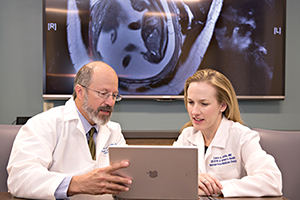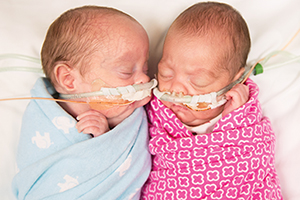By COLLEEN SCHRAPPEN
Lots of people pass through the doors of St. Louis Fetal Care Institute at SSM Health Cardinal Glennon Children's Hospital. Since it opened eight years ago, more than 1,500 expectant mothers have received care for prenatal complications ranging from heart and lung anomalies to genetic syndromes and twin abnormalities.
The institute's medical team comprises fetal care specialists, surgeons, technicians, nurses and social workers, plus dozens of specialists who come to the center from the pediatric hospital to coordinate care.

Dr. Mike Vlastos, medical director of the St. Louis Fetal Care Institute at SSM Health Cardinal Glennon Children's Hospital, and colleague Dr. Laura Vricella, a maternal-fetal medicine specialist, review an image of a fetus who could be a candidate for fetal surgery. The image on the laptop is visible on the screen behind the doctors.
Teams of doctors from Europe, South America and the Middle East have visited the center to observe its program. A group from Heidelberg, Germany, came last year and returned home to perform a successful open-fetal surgery. Dr. Samer Elbabaa, the director of pediatric neurosurgery at Cardinal Glennon, and Dr. Mike Vlastos, the Fetal Care Institute's medical director, assisted. The procedure was the first of its kind in Heidelberg. The baby had myelomeningocele, the most serious form of spina bifida.
"They established a program that mirrors ours," said Elbabaa. "The baby was born a few months ago and is doing well."
Open-fetal surgery to treat myelomeningocele is still a relatively new technique. The Fetal Care Institute has performed about 55 such procedures since 2011, the year the federally sponsored Management of Myelomeningocele Study, known as MOMS, was published. The trial lasted eight years and compared outcomes for babies whose spines were repaired before and after birth. Patients were treated at the Children's Hospital of Philadelphia, Vanderbilt University and the University of California at San Francisco.
"When the paper came out in March 2011, other centers began to offer prenatal repair," Vlastos said. Institute surgeons performed their first fetal myelomeningocele repair at SSM Health St. Mary's Hospital St. Louis in May of that year.
Myelomeningocele is a condition in which a sac of fluid protrudes through an opening in the baby's back, damaging the spinal cord. It can cause brain damage and paralysis before the baby is even born.
"In the womb, the baby's spine is exposed to amniotic fluid," Vlastos said. "The nerves can disintegrate, leaving the baby paralyzed from that spot down."
Many of those babies also develop hydrocephalus, or fluid on the brain, and require a shunt, which can cause its own set of complications. Babies with spina bifida also are more prone to kidney, bladder and skin problems.

These twins were patients of the St. Louis Fetal Care Institute at SSM Health Cardinal Glennon Children's Hospital.
Each year, about 1,500 babies in the U.S. are born with spina bifida, according to the Centers for Disease Control and Prevention. Mothers who are obese, have low amounts of folic acid or who take anti-seizure medications are at increased risk of having a baby with the condition.
About half of the affected fetuses are candidates for prenatal surgery, said Vlastos. Babies who undergo open-fetal surgery have a decreased incidence of needing a shunt after birth to relieve fluid buildup on the brain, he said. In the MOMS trial, of children born with spina bifida, 82 percent needed a shunt.With prenatal surgery, only 40 percent did. Those children were also more likely to walk than babies who only received postnatal interventions.
The Fetal Care Institute has experienced results similar to the MOMS trial. "We are very pleased with the outcomes," said Elbabaa.
The biggest challenge of the surgery is that the team is operating on two patients simultaneously. The mother and her fetus must meet certain inclusion and exclusion criteria to qualify for fetal surgery. A baby who has other anomalies in addition to spina bifida may not be a candidate for the fetal surgery.
"The maternal fetal medicine specialist is working on the mother, and I am working on the fetus, who is dependent on the mother. You are working on two souls," Elbabaa said. "You are working efficiently because the fetus does not tolerate the outside world. You are concerned about giving the fetus the best outcome."
The surgery typically takes three to four hours, Elbabaa said, and is performed between the 19th and 26th week of pregnancy. Mothers must have a C-section for that birth and any subsequent births.
"Most fetal intervention is done because we're afraid we're going to lose the kid," said Vlastos. "But this is to create a better life for the kid. It's two different paradigms."
As science and technology improve, the institute eventually hopes to be able to perform the spina bifida intervention using a scope instead of an open incision, Vlastos said. The minimally invasive approach would decrease the risk to mothers.
In addition to the highly skilled surgery and other interventions that can change a bad outcome to a better one, the Fetal Care Institute offers support for families.
Whatever the condition, said program coordinator Katie Francis, who has been at the institute since its inception, "our job is to educate parents on what's going on with the baby, prognosticate if we can, prepare for birth and what will happen after birth. When these moms come to us, they're in crisis. Their world has been rocked, they're scared to death."
The institute, one of about a dozen in the U.S. that can perform open-fetal surgery, serves as a bridge between obstetrics, high-risk neonatal care and pediatrics, Francis said. This year, the center will undergo a renovation so that fetal echocardiograms and ultrasounds will be done in the same place, making it easier for cardiologists, high-risk obstetricians and mothers to communicate with one another.
It will be another means for the center to fulfill its mission of changing lives through a combination of innovative medical options and compassionate care.
"We are there to provide advocacy and support," Francis said.
Copyright © 2017 by the Catholic Health Association
of the United States
For reprint permission, contact Betty Crosby
or call (314) 253-3490.